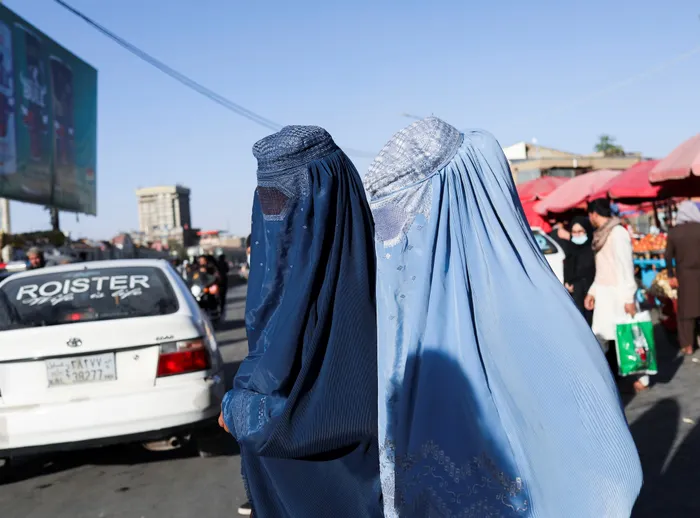Will the Taliban enforce Women’s Rights?

FILE – Afghan women walk down a street in Kabul, Afghanistan, on September 16, 2021. File photo: West Asia News Agency (WANA) via Reuters
OPINION: The Taliban is working hard to propagate a new image that they have changed with the times, are more reasonable in their implementation of Islamic law, and are not to be feared, writes Shannon Ebrahim.
The Al Jazeera interview last week with the new Taliban spokesperson for Foreign Affairs, Abdu Qahar Balkhi, presented a remarkably pragmatic tone for an Islamic state.
He said the Taliban was committed to dialogue and not provocative actions, is in favour of engagement with the international community, has direct communications with several countries, and seeks positive relations.
The unflustered and resolute manner in which Balkhi conducted himself during the interview explains why he secured such a high profile position at a young age. Pressed on gender issues, Balkhi claimed that the Taliban had guaranteed the rights to education, healthcare, and work given to women in Islam.
The Taliban has fought the long game and proven they have staying power, but now governing effectively and justly will be their greatest challenge. The leadership are all too well aware that the success and longevity of their rule will largely depend on the extent to which they can resurrect the country’s economy, and that requires major trade and investment from the outside world.
It also requires official recognition of their government. This will be hard to secure for as long as human rights organisations are able to point to persecution and discrimination against Afghan women and girls and barbaric punishments carried out in the name of Sharia law.
The Taliban is working hard to propagate a new image that they have changed with the times, are more reasonable in their implementation of Islamic law, and are not to be feared.
They have a long way to go if they want to convince the world that they do not intend to repeat the draconian nature of their rule from 1996-2001 when the Taliban decreed that all women should be banned from employment. It is estimated that 25% of government employees were female at the time, and when compounded by losses in other sectors, many thousands of women were affected.
During those five years of Taliban rule, the morality police from the Ministry for the Propagation of Virtue and Prevention of Vice would drive around in pick up trucks, publicly humiliating and whipping women who did not adhere to their rules. In 1996, a woman in Kabul had the end of her thumb cut off for wearing nail polish, according to Amnesty International. Women who were accused of adultery were stoned to death.
If the Taliban were to return to this form of barbarity, their government will not be embraced by the rest of the world, which explains the public relations campaign of the new leadership to convince the world that Afghan women will have their rights.
But saying that and ensuring the rights of Afghan women are protected seem to be two different things. When the world has pointed to blatant persecution of women and girls since the Taliban takeover, the government is quick to respond that they need time to train their regional officials and rank and file to adhere to the government’s rules. Only time will tell if the Afghan government means what it says, but the track record of the past two months leaves much to be desired.
Balkhi was adamant in his Al Jazeera interview that girls would be allowed to go to school. The reality on the ground, however, was that boys were allowed to go back to secondary school on September 18, but not girls. The international outcry led to high school girls in four northern provinces being allowed to return to school, but girls have not been allowed to go to school in the south, east and central Afghanistan.
Reports from the ground this week say that every locality is being treated differently on a different ruling and that a nationwide announcement is needed calling on girls’ schools to open immediately. The Taliban provincial education director explained the new rules: no women may teach boys above grade six or seven, and all staff of the school have to be the same gender as the students. There has also been a ban on women’s sports.
Zabiullah Mujahid, a Taliban spokesperson, said in an interview in Kabul on September 7 that women being accompanied by a mahram (male guardian) would only be required for travels longer than three days, not for daily activities such as attending work, school, shopping, medical appointments, and other needs.
But Taliban officials in Herat have not been consistent in carrying out the policy. Some women have complained that Taliban fighters had stopped them on the streets, at universities, and other public places and barred them from going about their business if they were not accompanied by a mahram.
In Herat, in western Afghanistan, recent reports were that Taliban gunmen guarded the university’s gates and prevented female students and instructors from entering the campus. At Kabul University, female students were told they were not allowed to leave their dorm rooms unless accompanied by a male guardian. Two students said they were effectively trapped because they had no male relatives in the city.
The experience of women in Herat has led to grave concerns about the extent to which the Taliban leadership in Kabul is able or willing to control the actions of their members across the country in all Afghan provinces in terms of women’s rights.
Assurances by the national leadership on women’s rights will end up being meaningless if women and girls continue to live in fear of being abused by the Taliban on the streets in which they live.
* Shannon Ebrahim is Independent Media’s Group Foreign Editor.
Insider